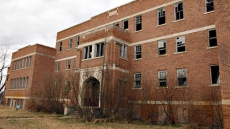TOFINO, B.C. — British media reports have identified a father and his teenaged son as two of the five Britons who died after a whale-watching boat sank off the west coast of Vancouver Island.
The reports say 50-year-old David Thomas, a managing architect with Microsoft UK, and his son Stephen were killed when the Leviathan II — with 27 people on board — sank on Sunday.
ITV News quotes the managing director of Microsoft UK as saying staff at the firm were saddened and shocked by news of the death of their colleague, who was described as a guru in IT software.
Britain's Telegraph newspaper says Stephen Thomas, who had Down Syndrome, died two weeks shy of his 19th birthday.
The teen was a keen photographer and in 2014 won top prize in a competition run by the Down's Syndrome Association with a photograph taken in Alberta's Banff National Park while on holiday with his family.
Stephen's 22-year-old brother, Paul Thomas, who was in the U.K. when the accident happened, told a local newspaper that his mother, Julie, was also on the whale-watching boat but survived and was in hospital.
The B.C. Coroners Service said the five people who died in the accident ranged in age from 18 to 76, and that four of them were men. Two of the five British nationals were living in Canada.
Twenty-one people were rescued and one person remained missing.
Australia's Department of Foreign Affairs and Trade confirmed in a statement that an Australian man was missing following the accident.
Australian Associated Press reported that the 27-year-old Sydney man's family said he was on the boat with his girlfriend and her family when it sank. His girlfriend's father was among the five British citizens confirmed dead, the Australian news agency said.
The owner of the whale-watching vessel has said he doesn't know why the boat would have flipped.
TRANSPORT CANADA INVESTIGATING WHALE-WATCHING BOAT THAT SANK OFF B.C. COAST
The whale-watching ship that sank off Vancouver Island and is now at the centre of multiple investigations was inspected annually since 1998 and certified to carry 46 passengers, a Transport Canada official said.
Five people died and another person is missing after the 20-metre long Leviathan II went down near the tourist town of Tofino, B.C., late Sunday afternoon.
Twenty-four tourists and three crew members were onboard at the time.

Transport Canada, the Transportation Safety Board, the RCMP and B.C.'s coroner are investigating.
Transport Canada spokeswoman Jillian Glover said the agency will investigate the ship's compliance with the Canada Shipping Act and its regulations at the time of the accident.
She said the vessel was last inspected March 6, 2015.
The agency's regulations state commercial vessels must have life-saving equipment, such as first-aid kits and life rafts, as well as distress-alerting equipment, such as radios and flares. There must also be life-jackets available for each person on board.
The ship's owner said the Leviathan II had about 50 adult life jackets, 20 children's life jackets and three life rafts.
But the rules don't require passengers to be wearing the flotation devices on larger boats with enclosed compartments, said Jamie Bray, owner of Jamie's Whaling Station.
"In the event of a sinking, it would be very difficult to exit a vessel when you're being held up onto a ceiling or the deck with a life jacket on," Bray told reporters Monday.

It's unclear what caused the boat to sink, but Bray said his ship had "an absolutely perfect" safety record.
"This is something just totally out of the blue," he said.
Serious incidents are incredibly rare in the whale-watching industry, said Michael Harris, executive director of the Pacific Whale Watching Association.
Jamie's Whaling Station is not part of the group, which Harris said takes about 400,000 people out on the water annually.
None of the 36 companies in the association has ever had so much as an injury on one of their tours, he added.
"It just doesn't happen and that's part of the shock. This is just a horrible tragedy."
Safety is incredibly important to the owners and operators of whale-watching tours, and the first thing tour operators do when passengers get on board is explain safety procedures, Harris said.
"We go above and beyond. We just make sure people are safe."

The people driving the boats know everything about the mechanics of their vessel and are keenly aware of the weather, similar to airline pilots, Harris said.
"Most importantly, what they share with commercial airline pilots is this keen sense that they have souls on board, that they are responsible for human beings. That is the priority."
Every crew member on board whale-watching boats in B.C. must have a Marine Emergency Duties certificate, said Andrew Lees, head naturalist with Five Star Whale Watching in Victoria.
Training for the certificate covers everything from firefighting to boarding life rafts.
"It's probably one of the most thorough exams that you'll find across the world," Lees said.
Many questions remain as to why the Leviathan went down and whether anything could have been done to save lives.
However, Lees doesn't believe the tragic incident will deter others from taking to the water.
"I think for the most part, people will recognize that this activity is an extremely safe one.," he said. "And this was a very, very rare tragic accident. I don't think it will put anybody off."

PREMIER’S STATEMENT ON WHALE-WATCHING TRAGEDY
Premier Christy Clark has issued the following statement on the tragic capsizing of the Leviathan II, a whale-watching tour boat near Tofino:
“Yesterday, a whale-watching vessel carrying 27 passengers and crew members capsized near Tofino. Canada Coast Guard, the RCMP and WestCoast Inland Search and Rescue responded quickly – but tragically, five lives were lost. The RCMP continues to search for one other missing individual.
“My thoughts and my prayers and those of all British Columbians go out to the families and the loved ones of those that were lost or injured.
“Emergency Management BC has been in close contact with the Joint Rescue Coordination Centre as it led efforts to ensure all available resources were available for the search and rescue, the survivors and responding communities.

“I understand there was tremendous co-operation amongst all the communities, agencies, emergency personnel and the Ahousaht First Nation, who worked together to respond.
“My thanks to all those involved in the rescue and the response and for their efforts during this tragic incident.”




